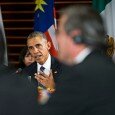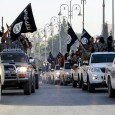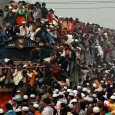By Ian Traynor –
Years of German-scripted austerity aimed at saving the euro have left the EU scarred and traumatised
David Cameron nudged Britain towards the European Union door marked exit. The Mediterranean turned into a sea of death for the tens of thousands fleeing murder and mayhem in the Middle East only to find the EU door tightly closed. Vladimir Putin unilaterally redrew the map of Europe, leaving the EU’s leaders looking on in feckless impotence. A popular backlash against mainstream EU elites saw Ukip win in the UK’s European elections and Marine Le Pen’s Front National repeat the trick in France, while the far right and the hard left did well everywhere in a massive vote of no confidence.
It has been a rough year for Europe. All the signs are it will get worse yet next year and up until 2017 at least, a fateful year for the European project that will see presidential elections in France, general elections in Germany and, probably, a referendum in Britain on quitting the EU.
But 2014 was the year, leaders claimed complacently, that Europe emerged from five years of financial, debt and currency crisis with its embattled euro single currency intact.
Arguably, though, the cure has done at least as much damage as the disease did in the first place. Years of German-scripted austerity aimed at saving the euro have left the EU scarred and traumatised, mired in no growth, no jobs, waning competitiveness, stagnation and deflation. The talk is of a lost decade and a lost generation. The complacency earlier in the year has given way to a sense of foreboding and gloom, with leaders admitting they have no idea where economic growth will come from.
Seldom have events conspired internationally and within the EU to produce such a tangled web of pressure points and vulnerabilities, highlighting leadership failures and confusion.
Europe’s strategy on Ukraine, its big unruly neighbour to the east, unravelled at the end of 2013 when President Viktor Yanukovych abruptly refused to sign a rapprochement pact with the EU that had been years in the making.
He bowed to Vladimir Putin in Moscow instead, triggering three months of demonstrations in Kiev that ended in a bloodbath and then Yanukovych’s sudden flight to Russia.
Poignantly, while affection for the EU slumped to new lows within, the Kiev protesters marched under the blue and yellow banners of the EU demonstrating the union’s persistent attractiveness to those outside.
Their triumph over Yanukovych was shortlived. Deploying his well-oiled battery of post-modern warfare techniques, Putin annexed Crimea then grabbed bits of eastern Ukraine, partitioning the country and calling Europe’s bluff.
Brussels, Berlin, Warsaw, London and the rest imposed sanctions that increasingly hurt Moscow. Whether they would alter Putin’s behaviour one whit remained another question. Talk and fear of war returned to haunt Europe. The 1914 centenary remembrance and the constant talk of “sleepwalking” into war seemed suddenly no longer merely academic or historical.
In and around Europe, 2014 threw up a host of questions – and precious few answers. Putin posed big questions about European security and defence, particularly in the east and in the Baltics. At a Nato summit in Wales, the Europeans and the Americans decided to establish the first semi-permanent bases in the east, to form “spearhead” units that could deploy to eastern Europe within days followed by brigade-strength forces of almost 5,000. But by year’s end, the plan was struggling to see the light of day, with the Americans leaving the moves to the Europeans who bickered about command and control, who was footing the bill, and logistical and equipment gaps.
In Brussels, the main EU institutions came under a new five-year leadership team. European parliament elections in May were the first since the currency crisis, the first pan-European response to years of austerity, recession and soaring unemployment.
The popular verdict was damning. The centre lost ground and the far right and hard left did well in France, the UK, the Netherlands, Greece, Austria, Denmark and Finland. The outcome meant that around one-third of the 751-strong parliament fell to varying hues of Eurosceptic, from the outright rejectionists of Ukip and the Front National to harsh critics on the left and centre-right. In response the two big centrist blocs pulled together in a form of grand coalition behind a new and restructured European commission under Jean-Claude Juncker, the ultimate EU insider who had run Luxembourg for two decades.
David Cameron fought a lone and livid campaign to stop Juncker. He failed, not for the first or last time in Europe. Within three days of Juncker taking over the EU executive in November, newspapers including the Guardian revealed how Luxembourg on his watch had become the biggest tax avoidance centre in the EU for the multinationals. Juncker disappeared for a week.
He had described his new commission team as Europe’s “last chance”. The words acquired a new meaning. Across the street from the European commission, the European council also came under new leadership. The year ended with Donald Tusk, the ex-Polish prime minister, chairing his first summit as president of the council after replacing Belgium’s Herman Van Rompuy. Federica Mogherini of Italy replaced Britain’s Catherine Ashton as the EU’s foreign policy chief coordinator.
Throughout the year, Cameron visited Brussels on summit business and made it self-evidently clear he despised the place. He banged the table – in public at least – made demands for British exceptionalism in Europe and increasingly stridently threatened to quit the EU if he did not get his way. He usually lost. Others became fed up with the UK. But they still do not want Britain to leave.
The British question, as well as Ukraine, Putin and the overall economic sclerosis, will dominate the year ahead, the UK issue moving into sharper focus after the general election in May. There is always an EU summit at the end of June. It will be then, in 2015, that Cameron – if he is still prime minister – will be expected to come clean and tell the rest what he needs to keep Britain in Europe.
Courtesy: The Guardian































































































